Lexus ES review - premium saloon is comfortably different from the mainstream
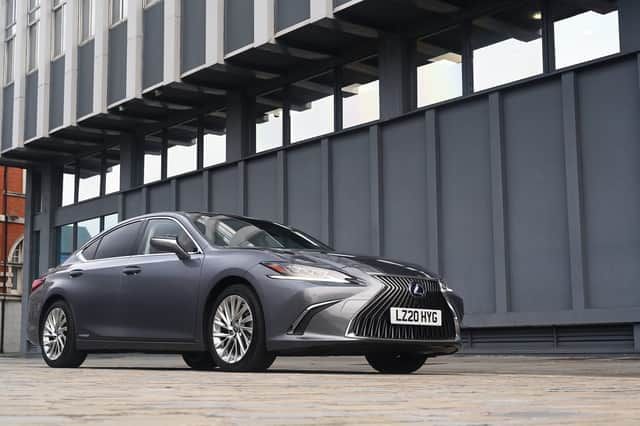

While its cars and dealers regularly top satisfaction surveys, its actual share of the market remains tiny.
Advertisement
Hide AdAdvertisement
Hide AdIn 2018, for example the Japanese premium brand sold just over 76,000 cars in Europe. In the same year, BMW sold more than 100,000 of its 5 Series alone.
It’s not something Lexus chiefs seem unduly worried about, though, thanks to massive sales in the US and Asia. Even the new ES has modest sales targets despite the fanfare with which it was launched.
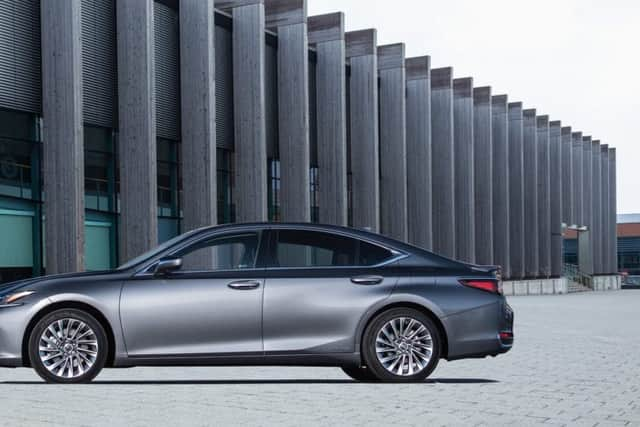

The ES is an all-new model, although previous generations have been sold elsewhere, and it replaces the GS in the large executive saloon market.
In Europe, three models - the BMW 5 Series, Audi A6 and Mercedes E-Class - account for 80 per cent of this market but Lexus says it isn’t trying to topple the Germans but offer an alternative.
Advertisement
Hide AdAdvertisement
Hide AdKey to that approach is offering plenty of bang for your buck.
Starting at £35,200 every ES gets healthy equipment levels - higher pound-for-pound than rivals, reckon Lexus. Lexus Safety System+ is standard, with adaptive cruise, lane keep assist and pre-collision braking with cyclist detection and the ability to detect pedestrians in the dark. The suite of systems is part of the reason the ES was ranked best in its class by Euro NCAP in 2018.
Lexus ES Takumi
- Price: £45,680 (Range from £35,150)
- Engine: 2.5-litre, four-cylinder, petrol hybrid with electric motor
- Power: 215bhp
- Torque: n/a
- Transmission: CVT
- Top speed: 112mph
- 0-62mph: 8.9 seconds
- Economy: 48.7mpg
- CO2 emissions: 125g/km
All models get a eight-inch media/nav screen, heated and vented seats, acoustic glass, keyless entry/start, a sunroof, and dual-zone climate control.
Predicted best-seller the F Sport gets some sporty styling and adaptive suspension while the luxury-oriented Takumi adds a 12-3.inch screen, 17-speaker Mark Levinson stereo reclining rear seats, a massive head-up display and adaptive LED headlights.
Advertisement
Hide AdAdvertisement
Hide AdThe equipment reflects Lexus’s traditional method of offering high-end specifications in simple to understand packages rather than endless options lists.
Also keeping things simple is the decision to offer only one engine - a petrol/electric hybrid.
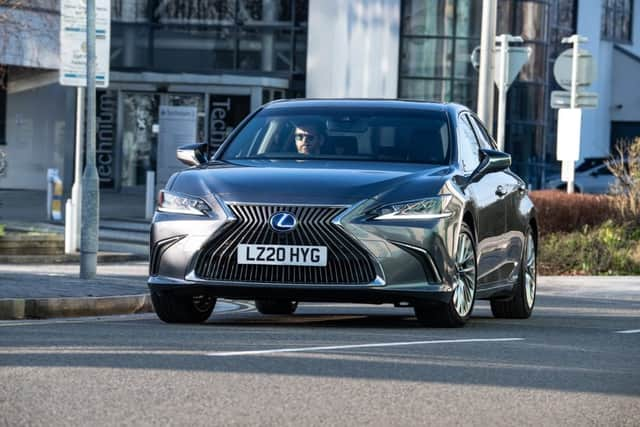

Lexus have been building self-charging hybrids for a long time now but the ES’s powertrain is completely new. Much head-scratching and tinkering has resulted in a more powerful yet more efficient 2.5-litre petrol engine and a smaller, lighter and more powerful electric motor assembly.
In combination, the two powerplants produce 215bhp but both can work in isolation depending on driving conditions.
Advertisement
Hide AdAdvertisement
Hide AdIn EV mode around town the ES glides near silently, making the switch to petrol or dual power seamlessly. Even then the powertrain is hushed, although a heavy right foot will result in a booming note from the engine, thanks in part to the CVT transmission.
Lexus says the hybrid control system has been tuned to reduce the rubber band feel of the CVT but there is simply no getting rid of it. It might be an improvement over previous boxes but there’s still a strange disconnect between engine speed and road speed.
Drive gently or at a constant cruise and you won’t notice it so much. You’ll also get claimed economy of up to 53mpg under the new WLTP test and CO2 emissions as low as 119g/km.
Those numbers are particularly relevant to business buyers and thanks to the hybrid’s low CO2 emissions it’s a strong option for those worried about things like P11D and benefit in kind.
Advertisement
Hide AdAdvertisement
Hide AdOn the road the Lexus isn’t going to worry the Germans in the driver involvement stakes. It’s big, easy and wafty and its front-driven chassis feels built for long-range motorway cruising rather than anything too enthusiastic.
Away from the motorway, it’s competent enough but you’re always aware of its size - it feels long and wide. Even with the F Sport’s adaptive suspension and Sport+ drive mode you won’t be fooled into thinking this is a compact sports saloon.
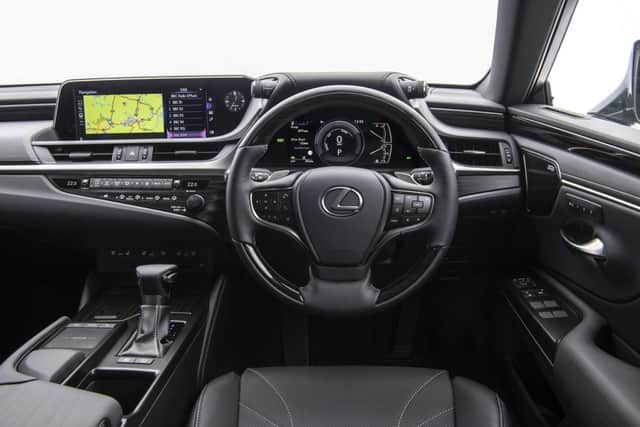

But you will be hugely comfortable.
Ride refinement is excellent and with or without the F Sport’s adaptive setup there’s an easy smoothness over scabby roads without a loss of control or composure.
Overall it’s very quiet, too. There’s acoustic glass and a huge amount of sound deadening and even the wheels have been designed to reduce noise. It means that conversations are easy at even motorway speeds. But there’s also still very evident roar from the tyres.
Advertisement
Hide AdAdvertisement
Hide AdThat intrusion aside, the ES interior is what you would want from a rival to the A6 and 5 Series.
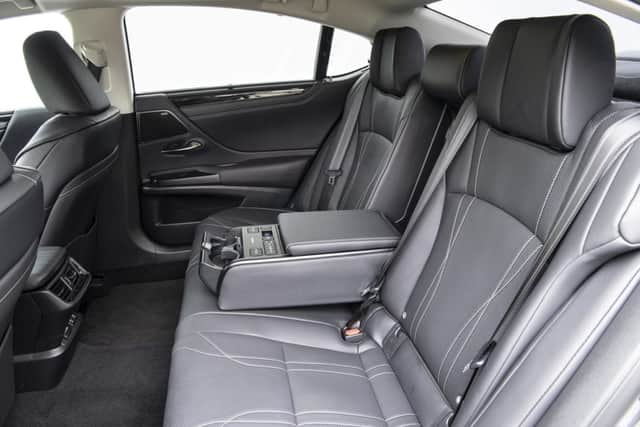

It’s clean and relatively simple, dominated by the screen anchored to the instrument binnacle on one side but floating in space on the other, reflecting the driver-focused asymmetry of the whole layout. The screen’s big, bright and clear but controlled via a fiddly touchpad rather than the easier touchscreen or rotary dial in rivals.
The overall look maybe isn’t as flash as the Germans or cool as the Volvo S90 but there’s no questioning the quality. Everywhere you look and touch you get an impression of solidity and craftsmanship.
The ES team apparently spent three years working on the seats and it was time well spent. Both the standard seats and the more figure-hugging F Sport ones are well cushioned and supportive without being to soft or grabby.
Advertisement
Hide AdAdvertisement
Hide AdThe rear seats are similarly supportive and rear legroom is fantastic - by Lexus’s metric it’s only fractionally behind the LS luxury saloon. Unfortunately, the “coupe-like” swoop of the roof means headroom is poor and even mere six-footers will find the headliner too close for comfort.
Lexus’s ambitions for the ES are relatively small and in a world where so many people want a “sporty” edge to their daily driver it will easily be outstripped by the BMWs and Mercedes. But for drivers looking for easy-going comfort and low running costs it’s an interesting alternative that comes packed with equipment and car park exclusivity.
This article first appeared on The Scotsman